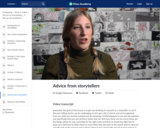
Some advice from our storytellers.
- Subject:
- Applied Science
- Arts and Humanities
- Computer Science
- Graphic Arts
- Material Type:
- Lesson
- Provider:
- Khan Academy
- Provider Set:
- Pixar
- Author:
- Disney Pixar
- Khan Academy
- Date Added:
- 07/14/2021

Some advice from our storytellers.
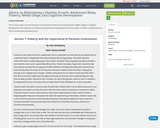
This resource goes over the importance of parental involvement during puberty, Piaget's stages of cognitive development, the importance of sleep during adolescent development, and the impact of media on adolescents as well as working during adolescence.
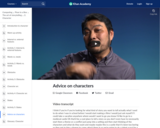
More advice to new writers.
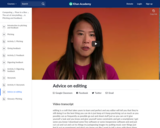
Advice on editing.
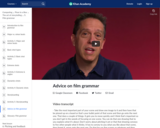
Advice for storytellers.
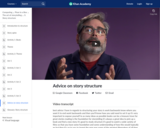
Advice from storytellers on structure.
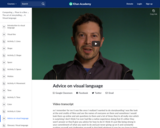
Advice from our storytellers.
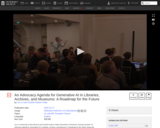
Leo Lo (University of New Mexico) and Cynthia Hudson Vitale (Association of Research Libraries) present 'An Advocacy Agenda for Generative AI in Libraries, Archives, and Museums: A Roadmap for the Future' during the Short Talks & Demos session at the Fantastic Futures ai4LAM 2023 annual conference. This item belongs to: movies/fantastic-futures-annual-international-conference-2023-ai-for-libraries-archives-and-museums-02.
This item has files of the following types: Archive BitTorrent, Item Tile, MP3, MPEG4, Metadata, PNG, Thumbnail, h.264 720P, h.264 IA

This presentation was prepared for the Council of Australian University Librarians OER Collective Community. The Community comprises mostly library staff who are supporting the production of open texts at thier institutions, many of whom are new to OER and open textbooks. The aim was to provide a foundation for advocacy for the adoption, adaptation, and authoring of open textbooks locally. Therefore, it establishes a shared definition and purpose of advocacy, especially as it relates to openness, and then provides six practical strategies for advocates that could be adapted and implemented for local contexts.
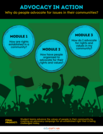
This unit begins by inviting students to tell the story of their community using artifacts from Washington's history. This allows them to reflect on shared values as well as how people have organized to advocate for those values. Then, students explore how rights are established in their community by analyzing the Washington State Constitution, the Puyallup Tribe Constitution, and the Treaty of Medicine Creek. Next, students investigate four different historic examples of how people have advocated for their rights and values in their community and choose one to research in further depth. In the final phase of the unit, student teams develop an advocacy campaign for a right that is currently being challenged. They conduct research on an issue of their choice, create and execute an action plan, and participate in an advocacy fair to campaign for change in their community. Finally, students draw on what they've learned to answer the unit driving question: "Why do people advocate for issues in their community?"
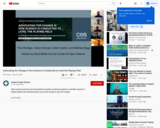
Open science practices have the potential to greatly accelerate progress in scientific research if widely adopted, but individual action may not be enough to...
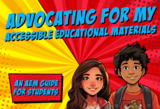
Advocating For My Accessible Educational Materials (AEM) is a workbook designed for students to use as they begin to learn to advocate for the accommodations and accessibility features they need in their educational programs. It applies common self-advocacy principles to the needs of students who use AEM in their daily educational programs. Students and their support teams will find this guide useful when an assessment has been completed to establish the need for accessible educational materials, technology, and assistive technology. In creating this workbook, the authors have assumed that the student is already using their AEM in functional ways in their educational environments. Because students can start building self-advocacy skills as soon as they begin to use AEM, individual sections of the workbook may be useful as soon as students begin to learn to use AEM.
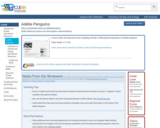
A short video that discusses how changing climate is affecting the population of AdÃlie penguins.
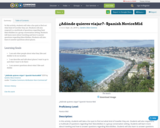
In this activity, students will take a fun quiz to find out what kind of traveller they are. Students will also respond to a multitude of questions regarding their likes/dislikes in a group conversation setting. Students will learn more about traveling and how to answer questions regarding likes/dislikes. Students will also learn to answer questions about places.
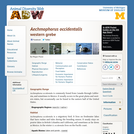
Aechmophorus occidentalis: Information
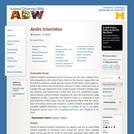
Aedes triseriatus: Information
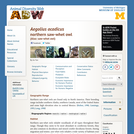
Aegolius acadicus: Information
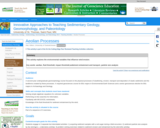
This activity explores the environmental variables that influence wind erosion.
Key words: aeolian, fluid threshold, impact threshold,sedeiment entrainment and transport, particle size analysis
(Note: this resource was added to OER Commons as part of a batch upload of over 2,200 records. If you notice an issue with the quality of the metadata, please let us know by using the 'report' button and we will flag it for consideration.)
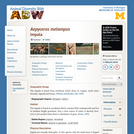
Aepyceros melampus: Information
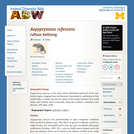
Aepyprymnus rufescens: Information